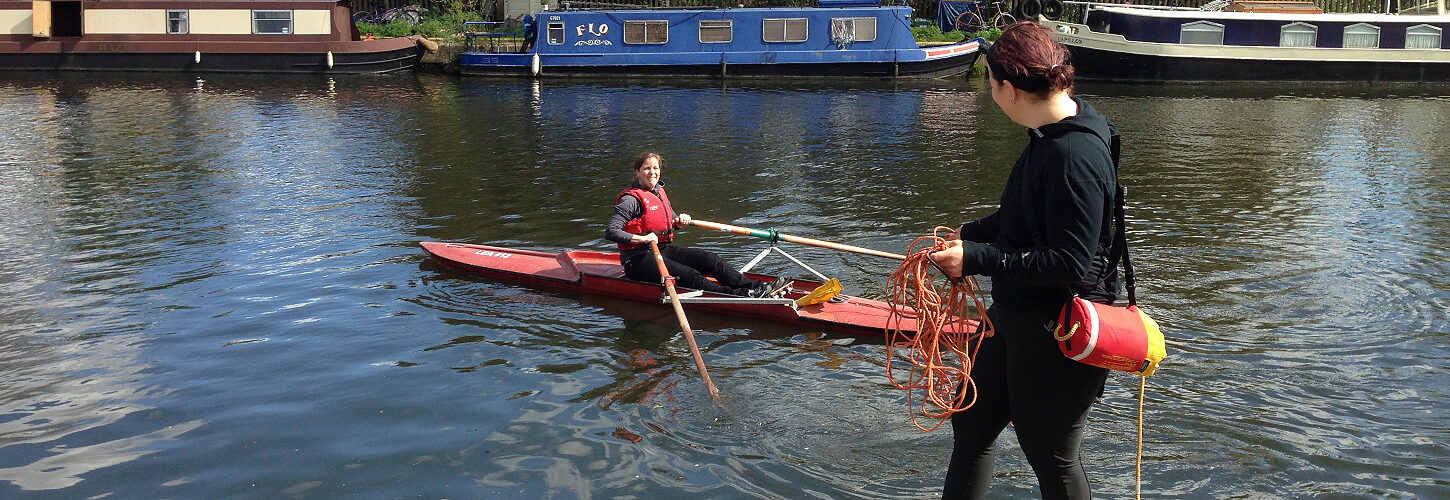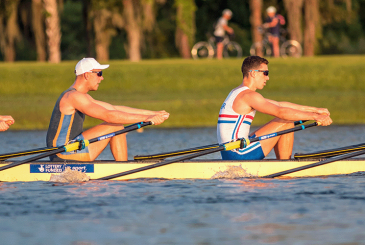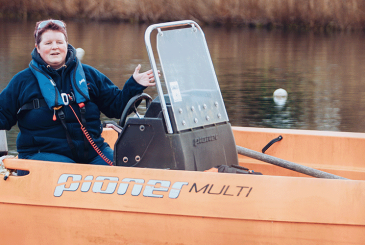Louise Nickerson volunteers to help coach learn to row courses at Lea Rowing Club. She talks to Joanne Harris
Learn to row courses have become a useful source of revenue for many clubs in the past few years. Lea Rowing Club in East London is no exception; the club runs adult and junior courses on its calm stretch of the River Lea, with the aim of bringing course graduates through to its novice and recreational squads afterwards.
The COVID-19 pandemic, however, has prompted a change in the way the club is running these courses. With no novice intake in the autumn of 2020 and a large number of would-be rowers on the learn to row waiting list, Lea decided to introduce shorter, three-week courses to get more people on the water and give them a taste of the sport.
“We very much feel that the Lea is a community-based club, so we wanted to make sure that we were providing for all those people,” explains Louise Nickerson, who is one of the club’s volunteer Level 2 coaches and involved with both its adult and junior programmes. “We’re also very committed to diversifying the people who are involved in rowing. We want to grow a community and be part of our local community.”
Nickerson says Lea has been looking at what will make people think that rowing is for them. Along with introducing the short courses it has made a few other changes to its system – such as enabling immediate booking for an introductory course, rather than being put on a waiting list.
“We want to capture that excitement to get the barrier to rowing lower,” she adds.
The introductory course is also fairly cheap, at £45 for the three sessions, and does not make any profit for the club. The thinking is that more of these beginners might become members and stay with Lea, which will generate more income long-term as well as building the community feel.
“It’s a route to fitness that involves being outdoors and in nature, even in the middle of a city”
Local groups involved at Lea include local children who are representative of Hackney, and a group of Orthodox Jewish women who Nickerson coaches. The latter group developed from an indoor rowing course for young Jewish women, and was started by Sally Lawrence who passed away last year. There are currently over 20 women in the group, with an equally long waiting list.
“They’re out there in a boat not dressed in traditional rowing kit, just going out there and enjoying it and participating in our club races,” Nickerson says.
The club has just begun the new shorter learn to row courses, but Nickerson says her impression, so far, is that those who have gone through them are keener to continue than those who previously started out with the longer courses.
“Part of it is they’ve not been able to do anything as a team sport for a very long time,” she thinks. “It’s not an exercise class, but it’s a route to fitness that involves being outdoors and in nature, even in the middle of a city.”
The short course covers the basics: how to carry a boat, put it on the water, take a stroke, and row together. Nickerson admits that there are challenges in coaching newcomers to rowing, especially older adults not used to exercise.
“Every single session you’re seeing an improvement, and you’re finding the right term for the right person”
“One of the biggest challenges is talking about body parts,” she says. “We talk about which muscles you need for which motion, and how to connect, and it’s almost like you need to teach them their body first. When we’re doing a three-week course, we don’t get into all of this, because it’s literally a focus on legs-body-arms, arms-body-legs.”
Getting beginners used to the vast quantity of rowing terminology is another challenge, and the way to overcome it is simple patience and repetition, Nickerson believes.
The courses attract a lot of women, particularly in their 40s, and Nickerson says the sport has a lot to offer this group.
“It has a team aspect and a grace to it, but it doesn’t have the strategy and the team interaction you get with something like football or netball. It’s a really lovely bridge to fitness and teamwork,” she says.
The benefits of learn to row courses can also be felt by the coaches, particularly watching newcomers come to love the sport.
“One of the things that’s really rewarding about learn to row is how fast they come on in those first few sessions,” Nickerson says. “Every single session you’re seeing an improvement, and you’re finding the right term for the right person. I enjoy those moments where you hit the right phrase and their eyes light up and the movement changes.”
Nickerson has now been coaching for about five years, having rowed for a decade before then.
“It provided a focus in my life that I found very rewarding,” she says, explaining why she enjoys rowing and coaching. “There’s something very special about being on the water. It doesn’t matter if you’re top level or just a beginner, there’s a joy in that.”










